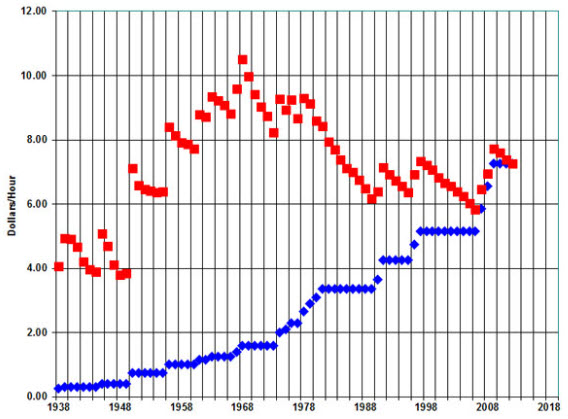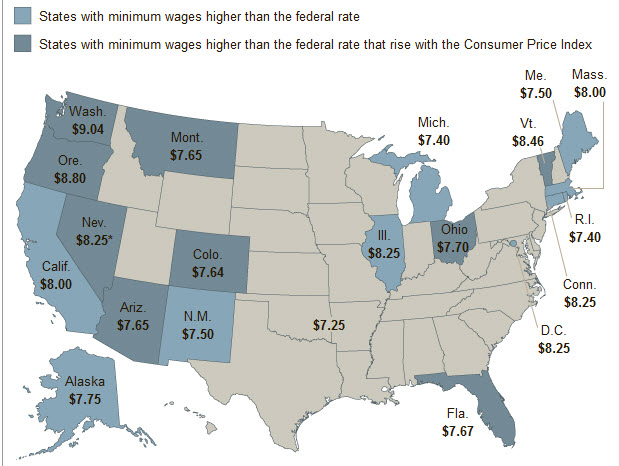Does the Safety Net Cushion Too Many?
There are ways to stem the creeping culture of dependency Jan 15 2013Entitlement spending is following an unsustainable trajectory. It consumes 65% of the federal budget, up from 21% in 1955, and 20% of the entire economy, says Robert Samuelson of the Washington Post. Such facile comparisons can be asymmetric, however; a closer look might show 1955’s safety net to be unacceptably Dickensian.
But popular though they are, the big three — Medicare, Medicaid and Social Security — swallow 46% of federal funds and with 10,000 baby boomers retiring every day, they are slated to consume 61% by 2030. Herb Stein, chairman of the Council of Economic Advisers under Nixon and Ford said, "If something cannot go on forever, it will stop," but with government factions at loggerheads years on end, we’re left to wonder how Stein’s law will play out.
We pay for Medicare and Social Security — nowhere near enough as it turns out, given increased longevity and other factors — and hence we think we are entitled to those benefits, but entitlements encompass numerous other government programs that are outright transfers of taxpayer money to others. Medicaid, unemployment benefits, the Earned Income Tax Credit and food stamps are major examples.
food fightFood stamps come in for particular ire from some. Over 46 million Americans pay for their groceries with federal food stamps. Half of the mouths that food stamps feed belong to children. It is a 40-year-old program (renamed “Supplemental Nutrition Assistance Program” or SNAP) but only in recent years has it ballooned to one in seven people, currently costing taxpayers $72 billion a year.
The rapid increase owes partly to the weak economy that has followed the financial crisis of 2008, but also to a loosening of the eligibility rules to assist the victims of that economy. It is no longer required that a family sell off all its assets and belongings to qualify, for example.
But Congress sees only the cost. Food stamps are part of the perennially stalled farm bill, which comes up every five years. Congress has repeatedly passed temporary bills with sunset clauses. A mare’s nest of subsidies from crop insurance energy, telecommunications, forestry — you name it — the current extension expired last September 30. Since then we have therefore technically reverted to the last permanent bill passed as law — in 1949. You read that correctly.
It may be a farm bill but food stamps make up 79% of the near trillion dollar ten-year bill the Senate passed last June. (Yes, June, and it is now January with nothing having been passed). They cut $4.5 billion from food stamps. House Republicans want to cut $16.1 billion, which would drop about three million Americans out of the program. but their bill has never made it to the floor for vote because of those who say cuts are not deep enough.
The swelling numbers in people and dollars says to conservatives that the program is out of hand. The Wall Street Journal’s editorial page is representative. An op-ed piece said about food stamps, “thanks to Obama’s stimulus, [the cost] doubled again between 2008 and 2012”, without mentioning that the stimulus aid was brought about by millions thrown out of work by the 2008 financial crisis that took food off their tables. Another is entirely about the military but has the gratuitous title “Defense vs. Food Stamps: What Would You choose?”. Or the editorial titled "Food Stamp Nation" which called food stamp recipients those “who who depend on taxpayers to buy one of life's most basic responsibilities. It's a good thing breathing air is free”.
Even these parsimonious scribes might soften their critiques were they simply to divide the annual cost by the number of recipients — cited as $71.8 billion and 46,670,373 in that very same editorial — and then the result by 52 and they would discover that the amount per person per week is to die for — literally — $29.59.
Cory Booker, the mayor of Newark, NJ, a city of 277,000 with 74,000 on food stamps, tried living on them for a week to see what his constituents were experiencing. And true to our math experiment, he got a meager $29.78 for a week of groceries. It was a week of nothing but salad, beans and broccoli, hunger pangs and fearing he would run out.
cause and effect
Here’s a hypothetical. If you think too many people are on the food stamp dole, wouldn’t their ranks diminish if those with low-paying jobs made more money? Yet all too often those same people who harangue about food stamps are those who inveigh against raising the minimum wage.
Now, it is true that the minimum wage would have to be raised quite a bit for someone to no longer need food stamps, although it is more of a possibility for a family with two wage earners. And where not possible, it only reflects on how far below the cost of living is the minimum wage. Even after successive raises in 2007 to 2009 it is only $7.25 an hour.
No one can live on that. It comes to $15,080 a year (less if no pay for holidays, 40 hour weeks, no docking for sick days, and of course no vacation). Somehow, less than $1,300 a month is supposed to pay for rent, food for children, light, heat, getting to work — and let’s hope no one gets sick. Our legislators are seemingly content to leave on the books a minimum that for a single mother with two kids is $4,000 below what is considered the poverty level by that same government. It is a wage that approaches slavery. If you find that an outrageous statement, consider that slaves, while paid nothing, were given shelter and food, which the minimum wage earner must pay for.
Yet whenever the issue is raised in Congress a chorus of business lobbyists descend on the Hill with money and dire predictions of calamitous job losses. They rely on numerous surveys of economists who, schooled by a canon that says when anything goes up, something must come down, have reflexively agreed that a minimum wage’s mere existence increases unemployment among low-skilled workers.
But those are just surveys of opinion. Actual studies say otherwise. Economists at the University of Massachusetts-Amherst “compared employment levels in contiguous areas with disparate minimum-wage levels over a 16-year period and concluded in a 2010 paper there are ‘strong earnings effects and no employment effects of minimum wage increases,’” according to commentary at Bloomberg/BusinessWeek, and studies before that have found employment effects to be slight.
If so, and employment remains stable after increases in the minimum wage, then opponents can legitimately make the case that prices must rise for all of us in order for businesses to recoup the cost. What’s wrong with that? Should our pockets be subsidized by holding the pay of those who produce the goods and services that we buy at a misery level?
downhill since 1968Last June Representative Jesse Jackson Jr. (D-Illinois) proposed boosting the wage to $10 an hour, and linking it finally to inflation, but there has been no progress in a Congress so ill-attuned to the people that its approval rating is no 9%. A Zogby Analytics poll found that 70% of Americans (and 54% of Republicans) support raising the minimum above $10 an hour.
Jackson — who has since resigned for mental health reasons — titled his bill the “Catching Up to 1968 in 2012" Act because, adjusted for inflation, the minimum wage has only declined since 1968, when it was $10.51 an hour, as this chart from the University of Oregon shows. 
The blue shows the nominal minimal wages across the years since
the first law passed in 1938. The red data points show those same rates
adjusted for inflation, with 1968 equal to $10.51 an hour and both series
arriving at today's $7.25.
In reaction to Jackson’s bill, Fox Business refuted its need by indirectly citing a study by economists at Miami and Florida State Universities who found that two-thirds of those hired at the minimum wage get a raise in their first twelve months, as if to say there is nothing wrong with a year at poverty wages and without mentioning whether the average raise was enough to lift them out of poverty.
Eighteen states have broken with the federal government and raised the minimum beyond $7.25, but the increases are mostly slight, and the highest is $9.04 in Washington State . 
Source: U.S. Department of Labor
Every dollar paid to a minimum wage earner is spent; it goes back into the economy. At that level, nothing goes under the mattress. Every cent is needed for the necessities of life. Every dollar of increase to that wage adds close to $2,000 per worker of further spending into the economy. And studies have also found that a minimum wage increase tends to push up wages of those earning more than the minimum, as business owners try to maintain hierarchies of pay grades.
Yet our lawmakers continue along two separate and conflicting tracks, holding the minimum wage at a brutish level while wondering why so many need food stamps. Were Congress to make that connection, they might find that forcing pay increases would cut the need for the food stamps that some so dislike. Or is that asking for logic beyond their pay grade?
Please subscribe if you haven't, or post a comment below about this article, or
click here to go to our front page.

